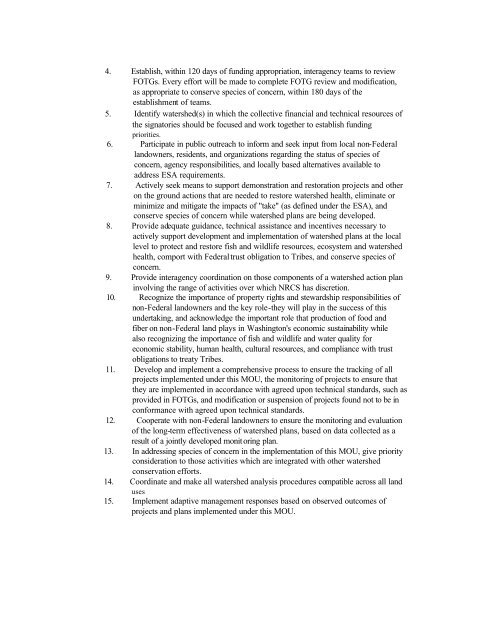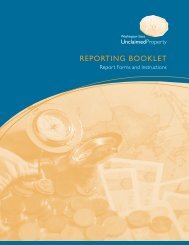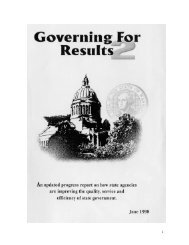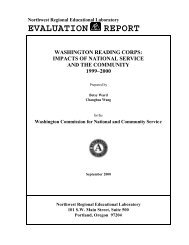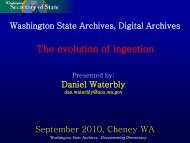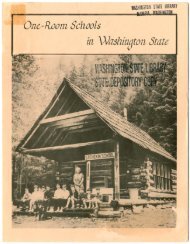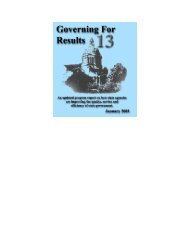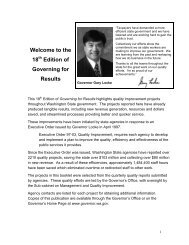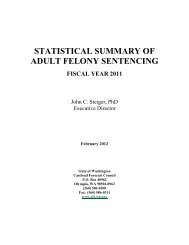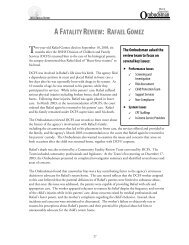MEMORANDUM OF UNDERSTANDING Between THE STATE OF ...
MEMORANDUM OF UNDERSTANDING Between THE STATE OF ...
MEMORANDUM OF UNDERSTANDING Between THE STATE OF ...
Create successful ePaper yourself
Turn your PDF publications into a flip-book with our unique Google optimized e-Paper software.
4. Establish, within 120 days of funding appropriation, interagency teams to review<br />
FOTGs. Every effort will be made to complete FOTG review and modification,<br />
as appropriate to conserve species of concern, within 180 days of the<br />
establishment of teams.<br />
5. Identify watershed(s) in which the collective financial and technical resources of<br />
the signatories should be focused and work together to establish funding<br />
priorities.<br />
6. Participate in public outreach to inform and seek input from local non-Federal<br />
landowners, residents, and organizations regarding the status of species of<br />
concern, agency responsibilities, and locally based alternatives available to<br />
address ESA requirements.<br />
7. Actively seek means to support demonstration and restoration projects and other<br />
on the ground actions that are needed to restore watershed health, eliminate or<br />
minimize and mitigate the impacts of "take" (as defined under the ESA), and<br />
conserve species of concern while watershed plans are being developed.<br />
8. Provide adequate guidance, technical assistance and incentives necessary to<br />
actively support development and implementation of watershed plans at the local<br />
level to protect and restore fish and wildlife resources, ecosystem and watershed<br />
health, comport with Federal trust obligation to Tribes, and conserve species of<br />
concern.<br />
9. Provide interagency coordination on those components of a watershed action plan<br />
involving the range of activities over which NRCS has discretion.<br />
10. Recognize the importance of property rights and stewardship responsibilities of<br />
non-Federal landowners and the key role-they will play in the success of this<br />
undertaking, and acknowledge the important role that production of food and<br />
fiber on non-Federal land plays in Washington's economic sustainability while<br />
also recognizing the importance of fish and wildlife and water quality for<br />
economic stability, human health, cultural resources, and compliance with trust<br />
obligations to treaty Tribes.<br />
11. Develop and implement a comprehensive process to ensure the tracking of all<br />
projects implemented under this MOU, the monitoring of projects to ensure that<br />
they are implemented in accordance with agreed upon technical standards, such as<br />
provided in FOTGs, and modification or suspension of projects found not to be in<br />
conformance with agreed upon technical standards.<br />
12. Cooperate with non-Federal landowners to ensure the monitoring and evaluation<br />
of the long-term effectiveness of watershed plans, based on data collected as a<br />
result of a jointly developed monit oring plan.<br />
13. In addressing species of concern in the implementation of this MOU, give priority<br />
consideration to those activities which are integrated with other watershed<br />
conservation efforts.<br />
14. Coordinate and make all watershed analysis procedures compatible across all land<br />
uses<br />
15. Implement adaptive management responses based on observed outcomes of<br />
projects and plans implemented under this MOU.


